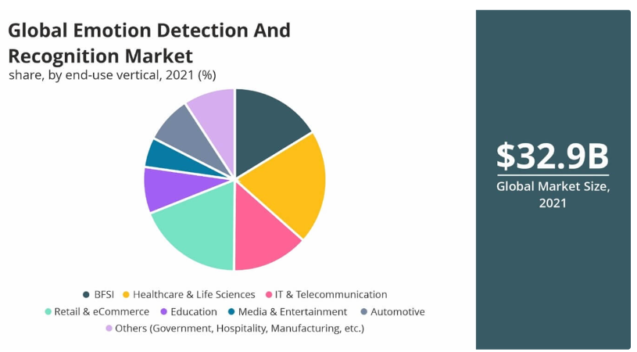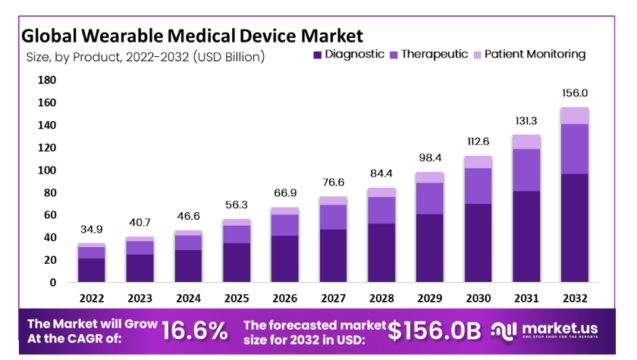While emotion AI promises to be a game-changer for multiple industries, from education to marketing and gaming, experts believe the sector the technology will ultimately disrupt is healthcare.
What can emotion AI do for patients and medical professionals? A lot. From mental health assessment to chronic disease management, patient monitoring and more, AI algorithms can make the lives of health workers easier and provide added value to the patient. ML software development solutions play a crucial role in building these AI algorithms, ensuring their effectiveness in healthcare applications. Moreover, AI software development services help create robust and scalable solutions that can enhance the healthcare experience for both patients and professionals.
Emotion AI, often also called affective AI or affective computing, is a branch of artificial intelligence where machines are trained to capture, interpret, and respond to human emotions.
Three main types of emotion AI include:
Text-focused emotion AI
Text-focused emotion AI evaluates written text to determine emotions. For instance, it can be used to assess emotions conveyed in text inputs such as customer reviews or feedback.
Audio and voice emotion AI
Audio and voice emotion AI considers human speech nuances like voice tones, vocal pitch, speed, and elongated pauses to determine whether the sentiments expressed are positive or negative.
Video and multimodal emotion AI
Video and multimodal emotion AI is used to process body language and facial cues.
This AI’s ability to understand human emotions is applied in multiple areas, from enhancing sales strategies to improving the immersion and engagement of the players in video games.
Still, the healthcare sector is one of the greatest beneficiaries of emotion AI’s implementation.

In 2021, the healthcare and life sciences sector led the global emotion detection and recognition market in revenue
Source: Grand View Research
Technologies Behind Emotion AI
To capture and respond to human emotions and moods, AI relies on a range of advanced technologies. Some of the core technologies include:
1. Machine Learning (ML)
The basic root emotions based on bodily involvement like happiness, anger, or sadness machines read pretty fast. However, emotions also can be hierarchical with lots of categories — as opposed to just negative or positive. Some emotions, like sarcasm, are super complex to understand for machines.
ML algorithms need to be trained on huge datasets of human emotional expressions to identify patterns and predict emotional states. Over time, these algorithms become more accurate and effective as they are exposed to more data.
2. Natural Language Processing (NLP)
By processing human language as it’s spoken and written, AI can interpret and comprehend the emotional context and sentiment behind the text.
3. Computer Vision And Facial Expression Recognition
These technologies can detect changes in facial expressions and body language and link this to an emotional state.
4. Physiological Signal Processing
Sensors can measure physiological signals like skin temperature, heart rate, respiration, brain activity, etc. This data serves as an extra context, improving the AI’s accuracy in assessing emotional status.
This Is What Artificial Emotional Intelligence Can Do To Help Us Achieve Personalized Healthcare
AI-based, emotion-tracking software fosters a more effective, compassionate, and personalized approach to patient care. Here are some examples of how affective AI makes healthcare better:
1. Ensures Personalized Treatment Planning
The foundation of personalized healthcare is creating customized treatment protocols based on individual health factors and needs.
Emotion detection AI systems can analyze physiological signals, conversational data, written surveys, and biosocial metrics to glean a holistic view of patients and offer more personalized, empathetic and effective care strategies.
2. Provides 24/7 Mental Health Support And Monitoring
Mental health disorders, particularly anxiety and depression, are on the rise worldwide. The lack of real-time interventions and objective measurements ultimately results in a substantial worsening of the disease and an increase in mental health crises.
Emotion-sensing wearables could become the answer for patients suffering from depressive and anxiety disorders. The technology ensures continuous, passive, high-precision monitoring of Electrodermal Activity (EDA), skin temperature, HRV, etc. providing the most accurate and reliable insight into a user’s mental health status.
Unlike self-reported data, emotion-sensing wearables give an objective and comprehensive overview of the patient’s state of health.
The devices allow doctors and caregivers to track mental health patterns and determine the optimal times and methods for communicating with people in their care.
A peer-reviewed study published in Frontiers in Digital Health confirmed that remote patient monitoring using emotion-sensing wearable devices, combined with digital interventions and coaching, offers continuous mental health support and significantly reduces anxiety and depression symptoms.

The anticipated growth of the global wearable medical devices market
Source: Market.us
3. Increases The Diagnostic Accuracy For Telemedicine Visits
The pressure of dealing with an ever-increasing number of patients and immense volumes of data make it nearly impossible, even for the best physicians, to evaluate patients’ health status to the level they would like.
Overloaded doctors can overlook the early signs of dangerous conditions, leaving patients with no help.
Affective AI’s capacity to detect emotions by analyzing micro-expressions that are too fast and subtle for a human eye to capture can enhance the accurate diagnosis of certain specific mental health conditions during virtual consultations.
4. Improves Care For The Elderly
Social interaction is crucial in combating social isolation and promoting positive mental well-being for older people.
AI-driven companion robots can engage in natural conversations, play games, and even assist in reminiscence therapy, offering emotional support and cognitive stimulation.
Also, these robots monitor vital signs, detect changes in mood or behavior, and notify caregivers of potential concerns.
It’s no surprise, then, that empathic robots that recognize what the person needs from their facial expressions and language style, the Buddy Robot, to cite an example, are becoming increasingly prevalent in homes and elder care facilities.
5. Facilitates Better Pregnancy Care
Industry professionals and researchers have now started pondering over the potential application of emotion AI in pregnancy care.
There is substantial evidence that stress, anxiety, and depression during pregnancy and in the months following birth are risk factors for adverse outcomes for mothers and children.
Emotion Recognition Technology could be used to assess the psychological status of women during pregnancy, childbirth and the postnatal period and take timely action to help them deal with the mental issues they may face.
6. Helps Those With Neurodiverse Conditions
AI-powered emotion recognition tools such as those developed by University of Scotland (UWS) academics can be game changers for people with neurodiverse conditions including autism.
Such devices can accurately read emotion-related signals from brain and facial analysis to interpret the emotional states of autistic individuals who often struggle with social interactions and emotional expression.
Emotion AI’s Challenges And Limitations
1. Data Quality And Privacy
The quality and availability of data are crucial in artificial intelligence because it directly impacts the performance, accuracy, and reliability of AI models.
However, healthcare data is often fragmented across multiple databases and systems. Besides, patient data can be inconsistent, with records containing inaccuracies or omissions, such as errors in patients’ diagnoses or medical history. Using flawed AI training data can result in unfair outcomes.
Privacy concerns related to the collection and use of personal health data must be tackled with strong security measures and transparent consent processes.
2. Regulation And Governance
While AI’s role becomes more prominent in clinical decision-making, patients increasingly need protection from misdiagnosis and the elimination of bias built into algorithms.
Yet, the regulation of healthcare AI — a completely new and dynamic field — is still in its early stages.
Companies looking to innovate and leverage AI in the healthcare sector will likely have to navigate regulatory gaps and uncertainties.
3. Lack Of Transparency
Many people think about AI systems as “black boxes” as it’s difficult to understand how they arrived at their decisions and predictions.
This lack of transparency can become a serious barrier to the adoption of AI-powered tools in sensitive scenarios where human lives are at stake.
There is a need to build AI systems that can help medical professionals make informed decisions by supplementing their knowledge with justified and understandable suggestions.
Unlock The Power Of Emotional Intelligence In Healthcare With Elinext
Elinext is a premier full-service custom software development company with a team of more than 700 dedicated software developers specializing in architecting scalable custom software solutions in Healthcare, Banking, Data Analytics, ERP and Asset Management, CRM and Loyalty, Artificial Intelligence, Machine Learning, Blockchain, Cybersecurity, IoT, and IT Infrastructure Management domains.
Our multi-year cross-domain knowledge (27+ years) empowers us to help healthtech startups, hospitals, medical facilities and pharmaceutical companies build and leverage innovative, highly interoperable technology solutions such as:
- Healthcare analytics software,
- EHR/EMR systems,
- mHealth apps,
- Telemedicine systems,
- IoT ecosystems, and others.
We know firsthand that healthcare is one of the most heavily regulated sectors on the planet. So, we build custom medical solutions strictly in line with the requirements of ISO 9001 and 27001, ISO 13485, HIPAA, PIPEDA, PHIPA, IEC 62304, and FDA 21 CFR Part 820.
The Medical Diagnosis System for European Mental Health Clinics case is a nice example of how we help our clients create disruptive healthcare technologies.
The Elinext team participated in developing a web solution for the use of administrators and research assistants in clinics working with patients suffering from schizophrenia. The solution included a mobile app for patients that would collect data the clinical researchers would later analyze.
The mobile solution was being developed by the client’s in-house team, while the Elinext team was tasked with building the mobile API that would allow the sharing of:
- Mood tracker results
- Tips
- Library
- Patient’s Goals
- Patient’s Strengths
- Messaging
- Good things (notes of positive events in a patient’s life)
- Patient’s Wellness plan
Our experts successfully coped with their task. Together with the client’s in-house team, we created a social-impact digital product that simplifies the lives of people with schizophrenia and those caring for them.









